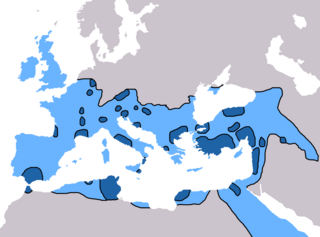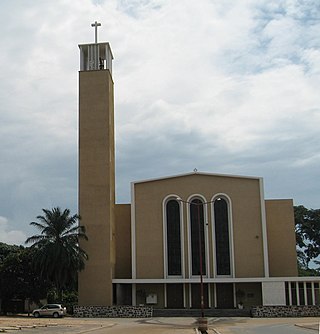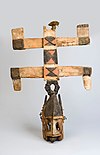
Over the centuries of Islamic history, Muslim rulers, Islamic scholars, and ordinary Muslims have held many different attitudes towards other religions. Attitudes have varied according to time, place and circumstance.
Religion in Africa is multifaceted and has been a major influence on art, culture and philosophy. Today, the continent's various populations and individuals are mostly adherents of Christianity, Islam, and to a lesser extent several traditional African religions. In Christian or Islamic communities, religious beliefs are also sometimes characterized with syncretism with the beliefs and practices of traditional religions.

Askia Muhammad I, born Muhammad ibn Abi Bakr al-Turi or Muhammad Ture, was the first ruler of the Askia dynasty of the Songhai Empire, reigning from 1493 to 1528. He is also known as Askia the Great, and his name in modern Songhai is Mamar Kassey. Askia Muhammad strengthened his empire and made it the largest empire in West Africa's history. At its peak under his reign, the Songhai Empire encompassed the Hausa states as far as Kano and much of the territory that had belonged to the Songhai empire in the east. His policies resulted in a rapid expansion of trade with Europe and Asia, the creation of many schools, and the establishment of Islam as an integral part of the empire.

Sunni Ali, also known as Si Ali, Sunni Ali Ber, was born in Ali Kolon. He reigned from about 1464 to 1492. Sunni Ali was the first king of the Songhai Empire, located in Africa and the 15th ruler of the Sunni dynasty. Under Sunni Ali's command, many cities were captured and then fortified, such as Timbuktu and Djenné. Sunni conducted a repressive policy against the scholars of Timbuktu, especially those of the Sankore region who were associated with the Tuareg whom Ali expelled to gain control of the town.

Islam is very important to traditional Malian culture. Muslims currently make up approximately 95 percent of the population of Mali. The majority of Muslims in Mali are Malikite Sunni, influenced with Sufism. Ahmadiyya and Shia branches are also present.

The Shona people are an ethnic group native to Southern Africa, primarily living in Zimbabwe where they form the majority of the population, as well as Mozambique, South Africa, and a worldwide diaspora including global celebrities such as Thandiwe Newton. There are five major Shona language/dialect clusters : Karanga, Zezuru, Korekore, Manyika and Ndau.

The traditional beliefs and practices of African people are highly diverse beliefs that include various ethnic religions. Generally, these traditions are oral rather than scriptural and are passed down from one generation to another through folk tales, songs, and festivals, and include beliefs in spirits and higher and lower gods, sometimes including a supreme being, as well as the veneration of the dead, and use of magic and traditional African medicine. Most religions can be described as animistic with various polytheistic and pantheistic aspects. The role of humanity is generally seen as one of harmonizing nature with the supernatural.

Christianity in Africa first arrived in Egypt in approximately 50 AD, reached the region around Carthage by the end of the second century. In the 4th century, the Aksumite empire in modern-day Ethiopia and Eritrea became one of the first regions in the world to adopt Christianity as its official religion. The Nubian kingdoms of Nobatia, Makuria and Alodia followed two centuries later. Important Africans who influenced the early development of Christianity include Tertullian, Perpetua, Felicity, Clement of Alexandria, Origen of Alexandria, Cyprian, Athanasius and Augustine of Hippo.

Christianity has a long history in the region that is now Sudan and South Sudan. Ancient Nubia was reached by Coptic Christianity by the 2nd century. The Coptic Church was later influenced by Greek Christianity, particularly during the Byzantine era. From the 7th century, the Christian Nubian kingdoms were threatened by the Islamic expansion, but the southernmost of these kingdoms, Alodia, survived until 1504.

Christianity is the largest religion in Ghana, with 71.3% of the population being member of various Christian denominations as of 2021 census. Islam is practised by 19.9% of the total population. According to a 2012 report by Pew Research, 51% of Muslims are followers of Sunni Islam, while approximately 16% belong to the Ahmadiyya movement and around 8% identify with Shia Islam, while the remainder are non-denominational Muslims.

Christianity is the largest religion in Benin, with substantial populations of Muslims and adherents of traditional faiths. According to the most recent 2020 estimate, the population of Benin is 52.2% Christian, 24.6% Muslim, 17.9 Animist and 5.3% follows other faiths or has no religion.

Botswana is a Christian majority nation. However, the country is officially secular and allows freedom of religious practice.

Christianity is the most widely professed religion in Zimbabwe, with Protestantism being its largest denomination.

Christianity is the dominant religion in Eswatini. The relative prevalence percentages vary by source. According to Pew Research, over 88% of the total 1.2 million population of Eswatini express Christianity to be their faith, over 0.2% express no affiliation. According to the US State Department religious freedom report of 2012, local religious leaders estimate that 90% of Eswatini's population is Christian, 2% are Muslim, while under 10% belong to other religious groups. According to the CIA World Factbook, the distribution is 40% Zionist, 20% Catholic, other Christians 30%, 2% Muslim and 8% other religions. In other sources such as Clay Potts, the religious demographics are 80% Christian, and 20% Islam and Traditional Swazi religion.

Christianity is the predominant religion in Gabon, with significant minorities of the adherents of Islam and traditional faiths.

The Western (Latin) and Eastern (Greek) divisions of Christianity began to take on distinctive shape in 7th-century Christianity. Whereas in the East the Church maintained its structure and character and evolved more slowly, in the West the Bishops of Rome were forced to adapt more quickly and flexibly to drastically changing circumstances. In particular, whereas the bishops of the East maintained clear allegiance to the Eastern Roman emperor, the Bishop of Rome, while maintaining nominal allegiance to the Eastern emperor, was forced to negotiate delicate balances with the "barbarian rulers" of the former Western provinces. Although the greater number of Christians remained in the East, the developments in the West would set the stage for major developments in the Christian world during the later Middle Ages.

Religion in Burundi is diverse, with Christianity being the dominant faith.
Mwari also known as Musikavanhu, Musiki, Tenzi and Ishe, is the Supreme Creator deity according to Shona traditional religion. It is believed that Mwari is the author of all things and all life and all is in him. The majority of this deity's followers are concentrated in Mozambique, South Africa, and Zimbabwe. Mwari is an omnipotent being, who rules over spirits and is the Supreme God of the religion.
The spread of Islam spans about 1,400 years. Muslim conquests following Muhammad's death led to the creation of the caliphates, occupying a vast geographical area; conversion to Islam was boosted by Arab Muslim forces conquering vast territories and building imperial structures over time. Most of the significant expansion occurred during the reign of the Rashidun from 632 to 661 CE, which was the reign of the first four successors of Muhammad. These early caliphates, coupled with Muslim economics and trading, the Islamic Golden Age, and the age of the Islamic gunpowder empires, resulted in Islam's spread outwards from Mecca towards the Indian, Atlantic, and Pacific Oceans and the creation of the Muslim world. The Islamic conquests, which culminated in the Arab empire being established across three continents, enriched the Muslim world, achieving the economic preconditions for the emergence of this institution owing to the emphasis attached to Islamic teachings. Trade played an important role in the spread of Islam in some parts of the world, such as Indonesia.
Religious syncretism is the blending of religious belief systems into a new system, or the incorporation of other beliefs into a religious tradition.















